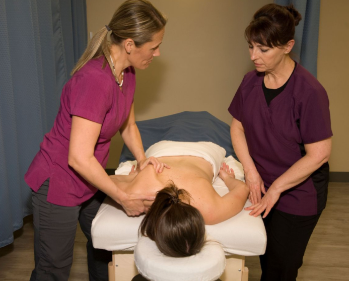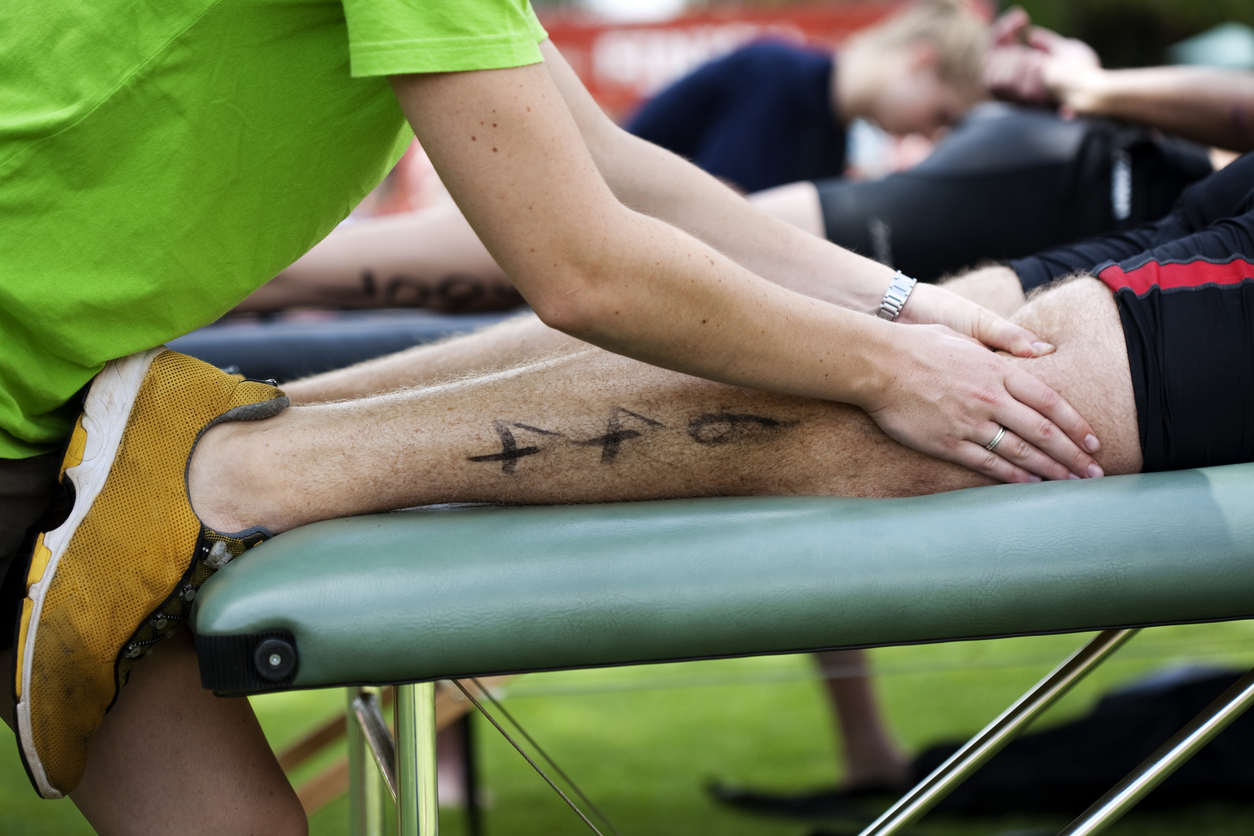What Do Massage Therapists Wear?
There are lots of wonderful things about being a massage therapist. Some of them are big and obvious: helping people heal, being your own boss, building strong therapeutic relationships with regular clients…the list goes on. And some of them are smaller, but no less satisfying. One of those little perks of the job that is sometimes underrated: the uniform is so darn comfortable!
Massage therapy is a physical profession, and a massage therapist’s wardrobe needs to be up to the task. RMTs need their clothes to meet a range of practical demands. So what is the work attire for a massage therapist?
There isn’t a universal uniform that all massage therapists wear, of course. Therapists choose their clothing based on their clinic environment, their personal preferences, and other factors.
But regardless of where a massage therapist works, there are some general principles that they all follow. In this blog post, we’ll give a general introduction to standard clothing, shoes, personal presentation, and PPE for massage therapists.
RMTs dress for success (and comfort, and hygiene, and flexibility…)
When it comes to clothing, the number one priority for massage therapists is always practicality. Everything that they wear is chosen because it will help them perform their jobs effectively, safely, and comfortably.
A massage therapist’s work outfit must meet all the following criteria:
- Allow a full range of movement of your entire body.
- Fit loosely, but not so loosely that they will accidentally touch a client while they’re working.
- Sleeves shouldn’t reach past the elbow.
- Fabrics should be breathable and suitable for the clinic conditions. Treatment rooms are kept at a comfortable temperature for the client, who is partially undressed and not moving. The therapist is moving and working hard, so light fabrics are best.. Some therapists will wear sweatbands on their foreheads!
- Everything needs to be machine-washable (including hot water washing).
- No jewelry that’s going to come in contact with the client. . This obviously means rings and bracelets, but includes long necklaces that can get in the way when you’re leaning close to your client.
- Long hair should be pulled back away so that it’s not in your face, and so there’s no chance it will touch your client.
- Fingernails must be kept extremely short with no nail polish, gel, or acrylics. This is for the sake of hygiene.
For most RMTs, the simplest way to tick all these boxes is to wear scrubs, or a scrub top with comfortable pants. Scrubs look professional, and are well-cut, light, and hold up well to frequent washing. There’s good news for those who want a hint of fashion along with their function, too. Scrubs have come a long way in the last few years, and there are lots of flattering styles, colours, and patterns available.
Put your best foot forward
A lot of people are drawn to massage therapy precisely because it’s not a desk job and they get to be up and moving all day. But being on your feet stops being fun when those feet start to hurt! Choosing comfortable, well-fitting footwear is a wise investment IN.Massage therapists wear flats that provide plenty of support and cushioning for their feet. Cushioning is especially important for therapists who work in treatment spaces with hard flooring like laminate, linoleum, and tile.
Safety first: Personal protective equipment for RMTs
Since the outbreak of COVID-19, massage therapists around the world have focused on keeping themselves and their clients safe, following the public health rules set by governments and professional organizations. This has included increasing the amount of personal protective equipment (PPE) that they wear while at work.
The use of PPE like masks and gloves isn’t new to massage, though. There are some techniques and circumstances that require special equipment to keep both the massage therapist and their client safe.
Take TMJD massage, for instance. Temporomandibular joint disorders are a group of conditions that can cause jaw pain and tightness, headaches, difficulty opening the mouth all the way, and noise when the jaw moves. It’s usually caused by muscle tension in the face, jaw, and neck as a result of stress, trauma, or postural dysfunction. Massage can be an extremely effective treatment for TMJD. Therapists use both extra-oral and intra-oral techniques. Extra-oral means outside of the mouth: the RMT massages the neck, face, and head. Intra-oral means inside the mouth: the RMT massages the muscles of the cheek and jaw from inside the client’s mouth. Massage therapists always wear disposable gloves when doing intra-oral work.
One more thing while we’re on the topic of COVID-19 precautions: most Canadian jurisdictions are beginning to loosen the public health restrictions that they created to fight the pandemic, including rules for massage therapy clinics. This is a welcome development because it’s a sign that all our sacrifices and hard work (and the time spent in line for the vaccine) are paying off! But as we all know, we’re not out of the woods yet. So though many mandatory restrictions have been lifted, a lot of massage therapists are choosing to keep some of their COVID-19 rules in place for now. Some clinics are still asking their clients to wear masks, and many are still wearing masks themselves. This is because many people who rely on massage as part of their health care routine are in higher-risk groups. By keeping some rules in place temporarily, therapists make sure that their clinic remains a safe space for their most vulnerable clients. When you book your next massage, make sure you double-check their latest clinic policies so you know what to expect!
What do Vicars students wear?
At MH Vicars School, we have a dress code that our students follow whenever they’re in class, at the clinic, or representing the school at an outreach event. Our students spend most of their time on campus doing hands-on work, so in order to be an effective student, they need to be dressed for the job.
The school dress code is a scrub top and plain loose-fitting scrub pants or athletic pants. Sweatpants and leggings are not permitted. Scrub tops may be any colour, pattern, or style, as long as they are clean and massage-appropriate. Midriffs and shoulders must stay covered;
the scrubs should fit loosely to allow full range of movement in class. Students wear cloed-toe shoes
Our dress code for class and clinics is very simple. Students, and many instructors, wear scrub tops and plain loose-fitting scrub bottoms or athletic pants. They wear flat, indoor-only supportive shoes, usually sneakers.
A career as rewarding as scrubs are comfortable
At MH Vicars School, you will develop the skills you need for a successful career as a massage therapist. Blended learning allows you to combine hands-on training with flexible at-home work. For more information about our exciting program, call our friendly admissions team toll-free at 1-866-491-0574 today or attend an online open house!




